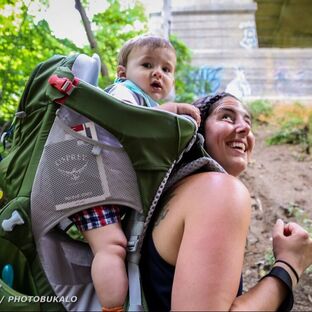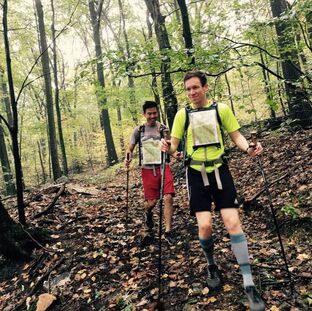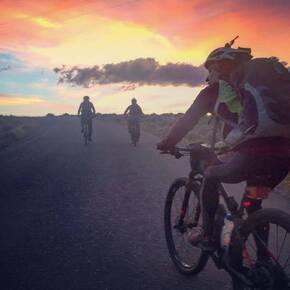|
For most new expedition race participants, some of the biggest questions - and perhaps fears - arises when contemplating preparation. What does it take to prepare for FIVE days of non-stop racing?! In this article, we are not going to provide a training plan because such plans are so individualized. Instead, we want to share some thoughts and ideas on how to get started. Once you have processed some of these insights and tips, we urge you to talk to other racers who have experience in training for multi-day events. Feel free to reach out with questions and keep an eye out for follow-up discussions regarding this topic and others in our “New To Expedition Racing” series, to be hosted on Facebook Live! First, a few things to keep in mind before filling in the training calendar that might help relieve some of the stress. Remember, we have all been where you are before: new to multi-day races, wide eyed over the momentous, unimaginable race you have signed up for, and wondering where to start. One of the most incredible things about AR is that it teaches us that we are capable of so much more than we can imagine, and much of the challenge is mental. This begins with our training. General Reflections
Training ApproachesAs for the actual training, there are a few primary ways to approach this. There is no right way to prepare for a multi-day race, and much of it will come down to your personal preference, your other commitments, and of course how much you want to invest in your preparation. Option One: Active-Lifestyle Training This first approach might be referred to as “active lifestyle training.” Such athletes tend to have busy lives and either have a hard time completing structured training or don’t enjoy it. As long as you are truly active, this might work for you. Such athletes regularly do some of if not all the following and find it’s enough to get through an event like this:
Keep in mind that you will likely be at a disadvantage to racers targeting training more unless you are naturally blessed with incredible endurance - but then again, you might be more mentally fresh when you get to the start line. This approach can work, particularly for those looking to simply experience the event. You will likely suffer more physically without more targeted training, but if your goal is simply to have an amazing adventure with your friends, completing a major event like this may still be attainable, albeit almost assuredly a short-course version of it. That said, you should be comfortable and competent with the skills required for the event and potentially ready for more mental challenges as your body won’t be as prepared for the physical strain of the journey. Teams that can persevere with less targeted physical training tend to have strong skills and a considerable amount of experience out in the wilderness and elements. They are strong navigators who are efficient with route choice, they are technically sound bikers, they are skilled paddlers, and they have strong, cohesive team dynamics that allow them to work through the event efficiently, sometimes even more effectively than some top teams. Without a strong base in the skills, the lack of physical preparation may be too much to overcome. Option Two: Structured Training
Many expedition racers try to get in at least one long ride and one long run per week as they prepare for a multi-day race. Defining what constitutes “long” is difficult, and new racers should be aware that too much too soon can impede your training, lead to overuse injuries, and potentially end your race before you even hit the start line. Build slowly and recognize that you don’t need to ride a century or run a marathon every weekend to be prepared. As noted above, a long weekend hike with a twenty-pound pack might be just as valuable, and maybe more so, than a three-hour run pounding pavement. A three hour mountain bike ride might only net you thirty miles, but it might help build more strength and help you develop your bike skills better than a road ride on a bike you won’t be using in the event anyway. Anything counts, but many racers find a balance between long hours and shorter ones with more intensity. Sometimes less is more. Overall, mix it up. It’s one of the joys of the sport and training for it. One week, you might run 3-4 times with a couple of other sessions on the bike and in a boat. The next week, you might focus on biking. Again, whatever fits your schedule, but if you can shoot for ten hours a week - give or take - maybe not right away but by the late spring, you will be more fully preparing your body for the challenges it will face over five days of racing. Option Three: The Coached Athlete Most racers don’t work with a coach, but there are major benefits from doing so. Yes, it costs more money, but professional coaching will almost assuredly prepare you better for the event, it will translate to better performance and subsequently less physical and mental struggle, and it will increase your chances to reach the finish line. It’s not a magic pill, and the race will still be very challenging, but almost everyone who works with a coach reports being better prepared and able to enjoy the race more thanks to that preparation. Additionally, coaches remove some of the mental strain for racers who may have trouble conceiving of a training plan. It can take a considerable amount of time and energy to plan effectively training week in and week out, and many new racers just don’t know where to start. A coach removes this worry and does that work for you, providing you added accountability. You are also working with an expert who understands nuance in training and preparation most of us never fully learn. For the Endless Mountains, we are excited to offer a special coaching opportunity. Experienced adventure racer and longtime endurance coach Jen Segger is offering a team package to teams competing in Pennsylvania in June. It’s a great way to start your journey and more affordable as she will offer a training program to the whole team. final thoughtsIn no particular order, consider the following suggestions and try to work them into your training plan:
0 Comments
Your comment will be posted after it is approved.
Leave a Reply. |



 RSS Feed
RSS Feed
